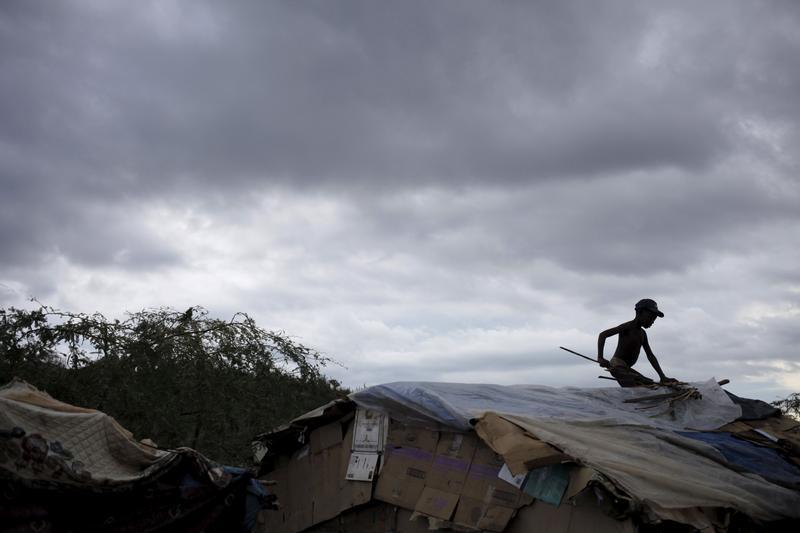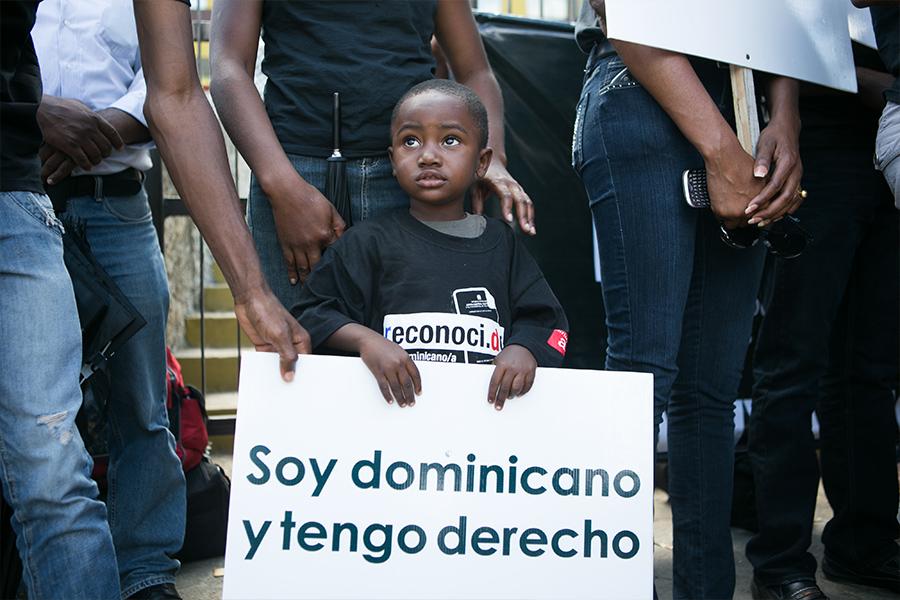The Horrors of a Hurricane, Doubled by Statelessness
LATIN AMERICA AND THE CARIBBEAN, 10 Oct 2016
Skye Wheeler | Human Rights Watch – TRANSCEND Media Service
People without Dominican, Haitian Citizenship Stranded as Hurricane Matthew Approaches
3 Oct 2016 – Hurricane “Matthew” is set to hit Haiti and Jamaica. Southern Haiti will likely be hit hard, including Anse-a-Pitres, one of the poorest and most remote areas of the island.
My thoughts tonight are with Haitians, but also with the perhaps thousands of stateless people—including children—along Haiti’s border with the Dominican Republic. They live in make-shift camps constructed from sticks, cardboard and clothes tied or sewn together into tent-like structures. I can’t imagine many worse places to be when a hurricane dumps 40 inches of rain.

A boy fixes the roof of a makeshift tent at a refugee camp for Haitians returning from the Dominican Republic on the outskirts of Anse-a-Pitres, Haiti, September 6, 2015.
© 2015 Reuters
Many of them were Haitians who migrated to the Dominican Republic for work, but left or were forcibly removed from the Dominican Republic when authorities re-started deportations of undocumented people. Others were born in the Dominican Republic and considered Dominican, until a 2013 court ruling retroactively removed citizenship from perhaps tens of thousands of Dominicans of Haitian descent.
At least 135,000 people have been deported or pressured to leave the Dominican Republic since last summer. They have gone to Haiti, but many do not consider themselves Haitian, and they may not have any Haitian identification.
I was in Anse-a-Pitres in early September, talking to women who were pregnant or had recently given birth in the destitute camps.
Lucille, 29, told me about her deportation in July 2015. She was picked up on the street and asked if she had Dominican identification papers. She said no, and was told to get in a truck. Immigration officers drove her to the border and told her to get out. She was separated from her children but eventually they came over the border to join her in Anse-a-Pitres’ Parc Cadeux camp.
Lucille was born in Dominican Republic and was Dominican – or at least until the court’s decision came down. In 2015, Human Rights Watch reported on the inadequate efforts by the Dominican government to remediate the situation before the deportations restarted.
The Dominican Republic should stop deporting those who were born as citizens in their country and should put in place workable mechanisms so people like Lucille are fully recognized as Dominicans. And if the deportations of non-Dominicans continue, they should be done in way that meets international standards, with cases assessed individually and family unity preserved.
I don’t know where Lucille and her children are sheltering today or where they will be when the hurricane hits tonight, but I know they shouldn’t be forced to be there at all.
___________________________________
Skye Wheeler – Researcher, Women’s Rights Division
DISCLAIMER: The statements, views and opinions expressed in pieces republished here are solely those of the authors and do not necessarily represent those of TMS. In accordance with title 17 U.S.C. section 107, this material is distributed without profit to those who have expressed a prior interest in receiving the included information for research and educational purposes. TMS has no affiliation whatsoever with the originator of this article nor is TMS endorsed or sponsored by the originator. “GO TO ORIGINAL” links are provided as a convenience to our readers and allow for verification of authenticity. However, as originating pages are often updated by their originating host sites, the versions posted may not match the versions our readers view when clicking the “GO TO ORIGINAL” links. This site contains copyrighted material the use of which has not always been specifically authorized by the copyright owner. We are making such material available in our efforts to advance understanding of environmental, political, human rights, economic, democracy, scientific, and social justice issues, etc. We believe this constitutes a ‘fair use’ of any such copyrighted material as provided for in section 107 of the US Copyright Law. In accordance with Title 17 U.S.C. Section 107, the material on this site is distributed without profit to those who have expressed a prior interest in receiving the included information for research and educational purposes. For more information go to: http://www.law.cornell.edu/uscode/17/107.shtml. If you wish to use copyrighted material from this site for purposes of your own that go beyond ‘fair use’, you must obtain permission from the copyright owner.
Read more
Click here to go to the current weekly digest or pick another article:
LATIN AMERICA AND THE CARIBBEAN:
